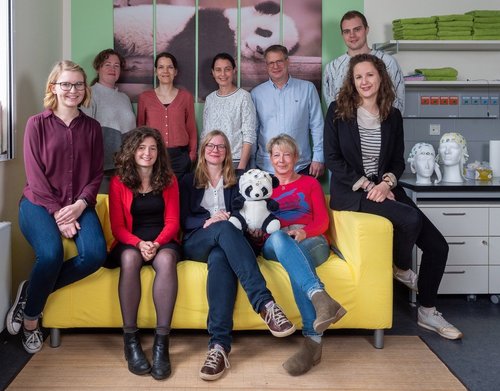Research Group Neurocognitive Development
The ability to focus on relevant information and to ignore irrelevant information is essential for learning success and academic performance. Our vision is to enhance the basic understanding of attention development throughout childhood. Auditory information has privileged access to perception and consciousness and needs to be controlled by attention. Despite this important function, little is known about the development of auditory attention in childhood. Since 2017, our group at LIN aims to close this gap and study the development of auditory attention and related learning and memory processes at the behavioral and brain level. We are particularly interested in how emotion, motivation and mobile digital media use influence attention. We also investigate attention in children suffering from attention disorders, which are of high prevalence and associated with learning disorders.
- News
News
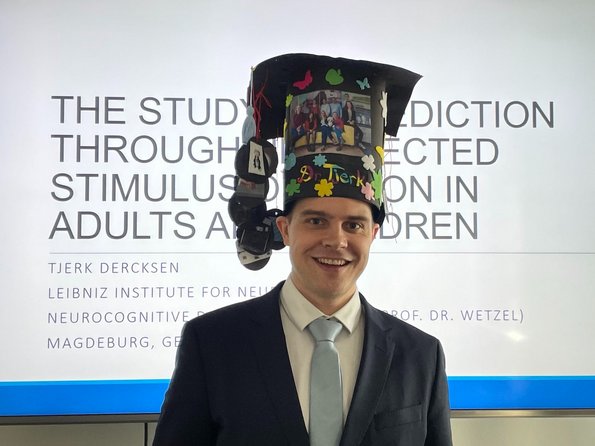
Congratulations to Tjerk! 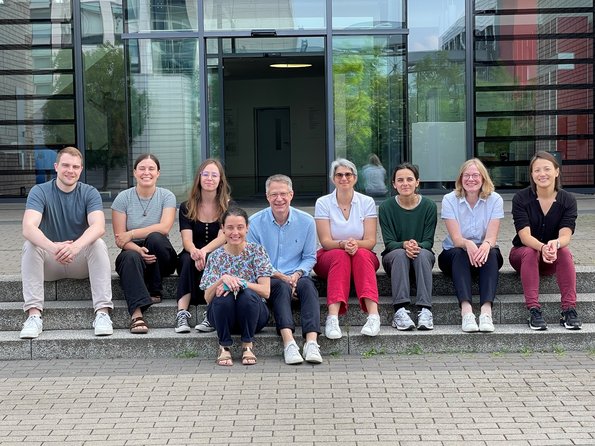
Visit from our French partner group 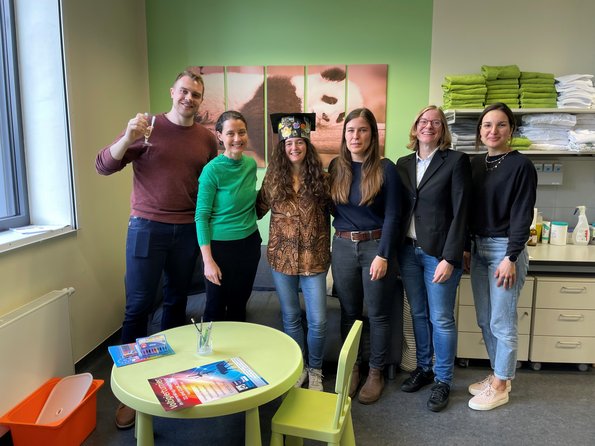
Congrats, Carolina! Classroom walls are often richly decorated. We investigated whether posters on the walls distract children's attention or enhance learning. Our results show that lesson-relevant posters captured more attention and improved learning. Importantly, lesson-irrelevant posters did not impair learning. The study has been published in Developmental Psychology.
Our medical doctoral student Christoph Gärtner has demonstrated that the specificity of sensory predictions, caused by own actions, influence pre-movement mechanisms. The study was conducted in collaboration with Max Stenner’s group and has been published in Imaging Neuroscience.
Surprising sounds delay the movements of table tennis players. Our new study in the journal Virtual Reality shows that attentional distraction can impair complex movements in (virtual) reality.
Nicole Wetzel gave a keynote speech on the development of auditory attention at the Hörhanse conference in Lübeck, Germany. Hörhanse brings together the expertise of various players in the field of hearing acoustics with the aim of promoting healthy hearing.
We are delighted that Tjerk Dercksen has received a research grant from the German Research Foundation (DFG) and will continue his research on the development of predictive processing in the children's brain in our group. Congratulations!
Together with Moritz Köster (University of Regensburg), Nicole Wetzel has organized a symposium on „Predictive processing in early development" at the International Congress of Infant Studies in Glasgow (July 20-24).
- Tjerk T. Dercksen (RG Neurocognitive Development) defended his dissertation "THE STUDY OF PREDICTION THROUGH UNEXPECTED STIMULUS OMISSION IN ADULTS AND CHILDREN" with great success on November, 22 2023. Congratulations!
- Our French partner group led by Dr. Aurélie Bidet-Caulet from the INSTITUT DE NEUROSCIENCES DES SYSTÈMES in Marseille visited us at LIN. We had an intensive exchange and further developed our joint ANR-DFG project on attention in childhood.
- Carolina Bonmassar (Neurocognitive Development) successfully defended her dissertation "The effects of emotion on involuntary attention in children and adults" with great success on April 18, 2023. Congratulations!
- Tjerk Dercksen and colleagues published a study in Frontiers in Psychiatry that presents conclusive evidence that the unexpected omission of a sound or tactile stimulus evokes a pupil dilation response, presumably reflecting surprise and the orienting of attention. This approach is well suited for use in clinical studies investigating predictive processing.
- Distraction control is a highly dynamic process that qualitatively and quantitatively differs between early vs. middle childhood as well as between children and adults (Developmental Science).
- In the podcast Science Talk, Nicole Wetzel explains what neurocognitive development is and why attention in particular is so important for learning in childhood.
- We are organizing a symposium at the Psychology and Brain conference in June 2022 in Freiburg (Germany)! Our guests will present current research results on the topic Prediction and Perception - moderated by Nicole Wetzel and Tjerk Dercksen.
New papers
- EEG is widely used to study information processing in the brain. In particular, this non-invasive method can be used to answer questions about the development of brain functions in children. In collaboration with Dr. Florian Scharf from the University of Münster, we have published a tutorial that provides a step-by-step introduction into the use of a temporal principal component analysis (PCA) of EEG data. Based on statistical properties of the data, specific patterns in the EEG can be identified. This approach is particularly relevant for children's data, as they often have an increased noise level.
- Wetzel, N., Kunke, D., & Widmann, A.. Tablet PC use directly affects children's perception and attention. (Wetzel, Kunke, & Widmann, Scientific Reports).
- Elementary school-age children are particularly prone to being distracted by sounds that are new. However, they rapidly learn to control their attention in such a situation and become less distracted (Wetzel, N., Widmann, A., & Scharf, F. Distraction of attention by novel sounds in children declines fast. Scientific Reports).
- The renowned journal Developmental Cognitive Neuroscience invited us to contribute to a special issue on "EEG Methods for Developmental Cognitive Neuroscientists: A Tutorial Approach“.
- Gaming on a tablet PC directly influences neuronal mechanisms that drive perception and attention in the developing brain (Wetzel, Kunke, & Widmann, Scientific Reports).
- When a sound is predicted but unexpectedly omitted, an omission response can be observed in the brain. The first study of our doctoral student Tjerk Dercksen suggests the existence of both specific and unspecific predictions along the sound processing hierarchy, where precision weighting possibly influences the strength of prediction error (Dercksen, Widmann, Schröger, & Wetzel (https://doi.org/10.1016/j.neuroimage.2020.116840), Neuroimage).
- The impact of emotional sounds on attentional orienting in children was demonstrated by Carolina Bonmassar. In her first PhD project she also observed a similar pattern of novel-related pupil dilation and brain responses that is in line with recent theories emphasizing the role of the Locus Coeruleus in attention processes and adds a developmental perspective. (Bonmassar, Widmann, & Wetzel, https://doi.org/10.1016/j.dcn.2020.100766, Developmental Cognitive Neuroscience)
- Pupil size can predict learning success
During memorization of pictures, changes in pupil diameter can predict later successful recognition in children aged 8-9 and adults. During retrieval, novel pictures showed stronger pupil constriction than familiar pictures. Wetzel, Einhäuser & Widmann, JECP
- New German-French project on attention development funded by DFG and ANR
Nicole Wetzel und Aurelie Bidet-Caulet (INSERM Lyon) will gain knowledge about the development of auditory attention and its underlying neuronal mechanisms throughout childhood. The project „Control of attention in children: Interaction of voluntary and involuntary attention“ is funded by the DFG and ANR in the program Franco-German Call in Humanities and Social Sciences“ (WE5026/4).
- Attention control considerably develops throughout early childhood
A new study demonstrates considerable development of attention control throughout early childhood. Wetzel, Scharf & Widmann, Child Development https://doi.org/10.1111/cdev.13109
- Head
Head

The research group of Nicole Wetzel was initiated at the LIN in 2017. Her research focuses on the development of attention and related processes, including learning and memory. The aim of her research covers different levels of cognition, ranging from the function of specific neuronal networks to the influence of classroom arrangement on successful learning. In her work, Nicole Wetzel favors interdisciplinary approaches in order to capture the development of attention from all angles.
Nicole Wetzel studied Psychology and obtained her postdoctoral lecture qualification from the University of Leipzig. She is a professor in Neurocognitive Development at the University of Applied Sciences Magdeburg-Stendal.
Nicole Wetze is the LIN representative for the Leibniz Education Research Network (LERN).
- Members
Members
Head Prof. Dr. Nicole Wetzel +49-391-6263-93441 nicole.wetzel@lin-magdeburg.de Postdocs Dr. Tjerk Dercksen +49-391-6263-93391 Tjerk.Dercksen@lin-magdeburg.de PhD students Fabian Aurich (med.) Christoph Gärtner (med.) Lilli Otto (med.) Valentina Tast (Secondary supervision) Lab Manager Dunja Kunke +49-391-6263-93431 dunja.kunke@lin-magdeburg.de Lab Assistant Gabriele Schöps +49-391-6263-95461 gabriele.schoeps@lin-magdeburg.de Secretary Martina Rabe +49-391-6263-94171 martina.rabe@lin-magdeburg.de Students Sophia Schleinitz Marit Giechau Lisa Schulze Sophie Borghoff Katharina Austermann Alumni Dr. Carolina Bonmassar Dr. Ranjan Debnath Dr. Ramona Grzeschik Dr. Paula Rios-Lopez Ursula Schöllkopf Dr. Elena Selezneva Andreas Widmann - Projects
Projects
Selection of current projects
1. How does attentional control develop during childhood?
In this area of research, we investigate involuntary distraction of attention and its underlying neuronal mechanisms. Our results show that the control of attention develops significantly between the ages of 4 and 6 years and continues to improve during primary school.
We currently investigate how children of different ages get distracted by new, emotional and meaningful events and what role motivational aspects play in distraction.
To include very young children in our research, we have developed a new approach which utilizes pupil size as a marker for attention processes.
2. How do children notice unexpected changes in their environment?
A second line of research focuses on the development of predictive sensory processes. Our brain cannot process all the input we get simultaneously. It is assumed that perception is the sum of the expectation generated by our brain and the actual information perceived by the sensory organs. We have shown that error signals in response to predicted, but omitted sounds are observed not only for specific, but also unspecific predictions and trigger an orienting of attention. We are investigating how expectations are formed and how error signals are being generated from a developmental perspective. Here we examine both the auditory and the tactile sensory systems.
3. How do learning processes develop?
This project investigates the relation between cognitive processes during learning and the success of this learning. We use pupillometry to look at early perceptual and memory processes during active learning and we compare these processes with the later learning achievement. Our goal is to identify the underlying neuronal mechanisms and their development. Another project examines the effects of bilingual reading upon learning and attention in educational contexts. Our aim is to investigate the influence that reading educational texts in different languages (i.e., German vs. English) might have upon comprehension and attention control (including neuronal mechanisms) — and therefore upon learning success— during adolescence.
4. How do tablets and other digital media influence the attention of children?
In this project, we are investigating the direct influence of digital media on perception and attention from a developmental perspective.
5. Do children with social anxiety process social and emotional stimuli differently to children without social anxiety?
In this collaboration project with Leipzig University, we investigate the perception of social and emotional stimuli as well as the attentional processes related to the degree of social anxiety in children.
6. How do attentional processes function in ADHD?
In this joint research project with the Otto von Guericke University Magdeburg, we analyze the attentional processes of patients with an ADHD diagnosis. We are interested in how patients process novel but irrelevant events and how they can focus their attention voluntarily.
7. How does the classroom arrangement affect attention and learning success?
In this collaboration project with the University Magdeburg-Stendal, we study the effect of different learning environments on attention and learning success in primary school-aged children.
- Third Party Funds
Third Party Funds
2024-2027
DFG DE4080/2-1
Investigating the impact of attention and cognitive control on prediction error in children and adolescents using auditory stimulus omissions
2020-2025
DFG WE5026/4-1
ANR - DFG Call in Humanities and Social Sciences, „Control of attention in children: Interaction of voluntary and involuntary attention“2018-2023
Leibniz Association
Programme for Women Professors
https://www.leibniz-gemeinschaft.de/en/about-us/leibniz-competition/projekte-2018/leibniz-programme-for-women-professors/2017-2022
CBBS ZS/2016/04/78120
Independent Research Group „Neurocognitive Development“
http://www.cbbs.eu/en/research-funding/cbbs-research-groups/research-groups-wetzel2016-2021
DFG WE 5026/1-2
Sachbeihilfe, "Die Verarbeitung neuer Distraktoren in Abhängigkeit von deren Informationsgehalt bei Kindern und Erwachsenen"
http://forschen.uni-leipzig.de/projects/cognitive-psychology-and-biological-psychology.html?id=35711 - Publications
Publications
2025
Widmann, A., Schröger, E., & Wetzel, N. (in press). Measuring the genuine mismatch negativity in the auditory multi-feature paradigm. European Journal of Neuroscience.
Keintzel, S. L. G. M., Wetzel, N., & Scharf, F. (in press). Analyzing the Dynamics of Auditory Distraction Using Multigroup Multilevel Structural Equation Modeling. Structural Equation Modeling: A Multidisciplinary Journal.Grundei, M., von der Behrens, W., Astikainen, P., Wetzel, N., & Blankenburg, F. (in press). The Somatosensory Mismatch Negativity. European Journal of Neuroscience.
Widmann, A., Schröger, E., Wetzel, N. (2025). Measuring the genuine mismatch negativity in the auditory multi-feature paradigm. PsyArxiv. https://doi.org/10.31234/osf.io/uabwr_v1
Grandjean A., Mathieu A., Chen S., Widmann A., Wetzel N., Bidet-Caulet A. (2024). Enhancing tonic arousal improves voluntary but not involuntary attention in humans. bioRxiv. https://doi.org/10.1101/2024.03.22.586259
Streuber, S.*, Wetzel, N.*, Pastel, S., Bürger, D., & Witte, K. (2025). Using a virtual reality oddball paradigm to study attention control in complex motor movements. Virtual Reality 29, 56. https://doi.org/10.1007/s10055-025-01111-6 *shared first authorship
Ríos-López P., Selezneva E., Schmitt A., Borke J., Wetzel N. 2025. Maximizing learning: Lesson-related wall decorations support learning while unrelated decorations do not hinder it. Developmental Psychology. https://doi.org/10.1037/dev0001963
Constant, M., Mandal, A., Asanowicz, D., Panek, B., Kotlewska, I., Yamaguchi, M., Gillmeister, H., Kerzel, D., Luque, D., Molinero, S., Vázquez-Millán, A., Pesciarelli, F., Borelli, E., Ramzaoui, H., Beck, M., Somon, B., Desantis, A., Castellanos, M. C., Martín-Arévalo, E., …, Wetzel, N.,... Liesefeld, H. R. (2025). A multilab investigation into the N2pc as an indicator of attentional selectivity: Direct replication of Eimer (1996).Cortex (in press) .https://doi.org/10.31234/osf.io/3472y_v4
Aurich, F., Widmann, A., Dercksen, T., Korka, B., Richter, A., Stenner, M.-P.*, Wetzel, N.* 2025. Flexibility and Neural Correlates of Action-Sound Predictions. bioRxiv. https://doi.org/10.1101/2025.03.19.644065 * shared senior authorship (equal contribution).
Gärtner C., Dercksen, T.T., Widmann A., Stenner M.-P.*, Wetzel N.* 2025. The Readiness Potential Reflects Detailed Prediction of Action Outcome. Imaging Neuroscience. 3: imag_a_00546. https://doi.org/10.1162/imag_a_00546 * shared senior authorship (equal contribution).
2024
Grandjean, A., Mathieu, A., Chen, S., Widmann, A., Wetzel, N. & Bidet-Caulet, A. (2024). Enhancing tonic arousal improves voluntary but not involuntary attention in humans. BioRxiv. doi: https://doi.org/10.1101
Dercksen T.T., Widmann A., Noesselt T., & Wetzel N. (2024). Somatosensory omissions reveal action-related predictive processing. Hum Brain Mapp. 45(4):e26550. doi: 10.1002/hbm.26550
2023Dercksen, T. T., Widmann, A. & Wetzel, N. (2023). Salient omissions-pupil dilation in response to unexpected omissions of sound and touch. Frontiers in Psychiatry (Sec. Computational Psychiatry) 14, 1143931. https://doi.org/10.3389/fpsyt.2023.1143931
Bonmassar, C., Scharf, F., Widmann, A., & Wetzel, N. (2023). On the relationship of arousal and attentional distraction by emotional novel sounds. Cognition. https://www.sciencedirect.com/science/article/pii/S001002772300104X
2022Debnath, R. & Wetzel, N. (in press). Processing of task-irrelevant sounds during typical everyday activities in children. Developmental Psychobiology. https://www.biorxiv.org/content/10.1101/2022.05.19.492605v1
Chung, W. Y., Darriba, Á., Korka, B., Widmann, A., Schröger, E., & Waszak, F. (in press). Action effect predictions in ‘what’, ‘when’, and ‘whether’ intentional actions. Brain Research.
Chung, H., Meyer, M., Debnath, R., Fox, N. A., & Woodward, A. (2022). Neural correlates of familiar and unfamiliar action in infancy. Journal of Experimental Child Psychology, 220, 105415. doi:10.1016/j.jecp.2022.105415. https://www.sciencedirect.com/science/article/pii/S0022096522000443
Dashtestani, H., Miguel, H. O., Condy, E. E., Zeytinoglu, S., Millerhagen, J. B., Debnath, R., Smith. E., Adali. T., Fox, N. A., & Gandjbakhche, A. H. (2022). Structured sparse multiset canonical correlation analysis of simultaneous fNIRS and EEG provides new insights into the human action-observation network. Scientific Reports, 12(1), 6878. doi:10.1038/s41598-022-10942-1. https://europepmc.org/article/med/35477980
Volkmer, S., Wetzel, N., Widmann, A., & Scharf, F. (in press). Attentional control in middle childhood is highly dynamic - Strong initial distraction is followed by advanced attention control. Developmental Science. https://psyarxiv.com/rkfg7/
Dercksen, T.T., Widmann, A., Noesselt, T., & Wetzel, N. (preprint). Somatosensory omissions reveal action-related predictive processing.https://psyarxiv.com/8aze5/
Mädebach, A., Widmann, A., Posch, M., Schröger, E., & Jescheniak, J. D. (in press). Hearing "Birch" Hampers Saying "Duck" – An ERP Study on Phonological Interference in Immediate and Delayed Word Production. Journal of Cognitive Neuroscience.
Meinhardt-Injac, B., Imhof, M., Wetzel, N., Klatte, M., & Schlittmeier, S.J., (in press). The Irrelevant Sound Effect on Serial Recall is Independent of Age and Inhibitory Control. Auditory Perception & Cognition.
Selezneva, E. & Wetzel, N. (2022). The impact of probabilistic cues on sound-related pupil dilation and ERP responses in 7–9-year-old children. Auditory Perception & Cognition. https://www.tandfonline.com/doi/full/10.1080/25742442.2022.2048592?src=
Rayson, H., Debnath, R, Alavizadeh, S. , Fox, N., Ferrari, F., & Bonaiuto, J.J. (2022). Detection and analysis of cortical beta bursts in developmental EEG Data. Developmental Cognitive Neuroscience. 54:101069. https://doi.org/10.1016/j.dcn.2022.101069
Ríos-López, P., Widmann, A., Bidet-Caulet, A., & Wetzel, N. (in press). The effect of background speech on attentive sound processing: A pupil dilation study. International Journal of Psychophysiology. https://psyarxiv.com/c6mju/
Scharf, F., Widmann, A., Bonmassar, C., & Wetzel, N. (2022). A tutorial on the use of temporal principal component analysis in developmental ERP research – Opportunities and challenges. Developmental Cognitive Neuroscience, 54, 101072. https://doi.org/10.1016/j.dcn.2022.101072
Dercksen, T.T., Widmann, A., Scharf, F., & Wetzel, N. (2022). Sound omission related brain responses in children. Developmental Cognitive Neuroscience. 53, 101045. https://www.sciencedirect.com/science/article/pii/S1878929321001341?via%3Dihub
2021
Selezneva, E., Brosch, M., Rathi, S., Vighneshvel, T., & Wetzel, N. (2021). Comparison of Pupil Dilation Responses to Unexpected Sounds in Monkeys and Humans. Frontiers in Psychology. https://doi.org/10.3389/fpsyg.2021.754604
Wetzel, N., Kunke, D., & Widmann, A. (2021). Tablet PC use directly affects children's perception and attention. Scientific Reports. https://www.nature.com/articles/s41598-021-00551-9
Ríos-López, P., Molinaro, N., Bourguignon, M., & Lallier, M. (2021). Right-hemisphere coherence to speech at pre-reading stages predicts reading performance one year later. Journal of Cognitive Psychology. 10.1080/20445911.2021.1986514
Wandres, M., Pfarr, S., Molnár, B., Schöllkopf, U., Ercsey-Ravasz, M., Sommer, W. H., & Körber, C. (2021). Alcohol and sweet reward are encoded by distinct meta-ensembles. Neuropharmacology, 108496. https://doi.org/10.1016/j.neuropharm.2021.108496
Molinaro, N., Lizarazu, M., Baldin, V., Pérez-Navarro, J., Lallier, M., & Ríos-López, P. (2021). Speech-brain phase coupling is enhanced in low contextual semantic predictability conditions. Neuropsychologia, 156, 107830. https://doi.org/10.1016/j.neuropsychologia.2021.107830
Ríos-López, P., Molinaro, N., Bourguignon, M., Lallier, M. (2021). Right-hemisphere coherence to speech at pre-reading stages predicts reading performance one year later. PsyArXiv. Preprint. https://doi.org/10.31234/osf.io/uw5nv
Meyer, M., Chung, H., Debnath, R., Fox, N., Woodward, A. (accepted). Social context shapes neural processing of others’ actions in 9-month-old infants. Journal of Experimental Child Psychology.
Troller‐Renfree, S.V., Morales, S., Leach, S.C., Bowers, M.E., Debnath, R., Fifer, W.P., Fox, N.A. and Noble, K.G. (2021). Feasibility of assessing brain activity using mobile, in‐home collection of electroencephalography: methods and analysis. Developmental Psychobiology. https://doi.org/10.1002/dev.22128
Fink-Lamotte, J., Widmann, A., Sering, K., Schröger, E., & Exner, C. (2021). Attentional processing of disgust and fear and its relationship with contamination-based obsessive-compulsive symptoms: Stronger response urgency to disgusting stimuli in disgust-prone individuals. Frontiers in Psychiatry. doi: 10.3389/fpsyt.2021.596557, https://www.frontiersin.org/articles/10.3389/fpsyt.2021.596557/abstract
Korka, B., Schröger, E., & Widmann, A. (in press). The encoding of stochastic regularities is facilitated by action-effect predictions. Scientific Reports https://doi.org/10.1038/s41598-021-86095-4
Dercksen*, T., Stuckenberg*, M., Schröger, E., Wetzel, N., & Widmann, A. (in press). Cross-modal predictive processing depends on context rather than local contingencies. Psychophysiology. https://doi.org/10.1111/psyp.13811 *shared First Authorship
Wetzel, N., Widmann, A., & Scharf, F. (2021). Distraction of attention by novel sounds in children declines fast. Scientific Reports. 5308 (2021). https://doi.org/10.1038/s41598-021-83528-y
Stuckenberg, M. V., Schröger, E., & Widmann, A. (2021). Modulation of early auditory processing by visual information: Prediction or bimodal integration? Attention, Perception, and Psychophysics. https://doi.org/10.3758/s13414-021-02240-1
2020
Bonmassar C, Widmann A, Wetzel N. 2020. The impact of novelty and emotion on attention-related neuronal and pupil responses in children. Developmental Cognitive Neuroscience. 42:Article 100766. https://doi.org/10.1016/j.dcn.2020.100766
Debnath, R., Miller, N. V., Morales, S., Seddio, K. R., & Fox, N. A. (2020). Investigating brain electrical activity and functional connectivity in adolescents with clinically elevated levels of ADHD symptoms in alpha frequency band. Brain Research, 1750, 147142. doi:10.1016/j.brainres.2020.147142
Dercksen TT, Widmann A, Schröger E, Wetzel N. 2020. Omission related brain responses reflect specific and unspecific action-effect couplings. NeuroImage. 215:116840. https://doi.org/10.1016/j.neuroimage.2020.116840
Fink-Lamotte J, Widmann A, Fader J, Exner C. 2020. Interpretation bias and contamination-based obsessive-compulsive symptoms influence emotional intensity related to disgust and fear. PLoS ONE. 15(4):e0232362. https://doi.org/10.1371/journal.pone.0232362
Hwang, H.G., Debnath, R., Meyer, M., Salo, V. C., Fox, N.A. & Woodward, A. (2020). Neighborhood racial demographics predict infants’ neural responses to people of different races. Developmental Science. e13070. https://doi.org/10.1111/desc.13070
Knyazeva S, Selezneva E, Gorkin A, Ohl FW, Brosch M. 2020. Representation of Auditory Task Components and of Their Relationships in Primate Auditory Cortex. Frontiers in Neuroscience. 14:Article 306. https://doi.org/10.3389/fnins.2020.00306
Korka, B., Schröger, E., & Widmann, A. (2020). What exactly is missing here? The sensory processing of unpredictable omissions is modulated by the specificity of expected action-effects. European Journal of Neuroscience. 52: 4667– 4683. https://doi.org/10.1111/ejn.14899
Male AG, O'Shea RP, Schröger E, Müller D, Roeber U, Widmann A. 2020. The quest for the genuine visual mismatch negativity (vMMN): Event-related potential indications of deviance detection for low-level visual features. Psychophysiology. 57(6):Article e13576. https://doi.org/10.1111/psyp.13576
Wetzel N, Einhäuser W, Widmann A. 2020. Picture-evoked changes in pupil size predict learning success in children. Journal of Experimental Child Psychology. 192:Article 104787. https://doi.org/10.1016/j.jecp.2019.104787
2019
Erb J, Ludwig AA, Kunke D, Fuchs M, Obleser J. 2019. Temporal sensitivity measured shortly after cochlear implantation predicts six-month speech recognition outcome. Ear and Hearing. 40(1):27-33. https://doi.org/10.1097/AUD.0000000000000588
Grzeschik R, Conroy-Dalton R, Innes A, Shanker S, Wiener JM. 2019. The contribution of visual attention and declining verbal memory abilities to age-related route learning deficits. Cognition. 187:50-61. https://doi.org/10.1016/j.cognition.2019.02.012
Korka B, Schröger E, Widmann A. 2019. Action-intention based and stimulus-regularity based predictions: Same or different?. Journal of Cognitive Neuroscience. 31(12):1917-1932. https://doi.org/10.1162/jocn_a_01456
Stuckenberg MV, Schröger E, Widmann A. 2019. Presentation Probability of Visual-Auditory Pairs Modulates Visually Induced Auditory Predictions. Journal of Cognitive Neuroscience. 31(8):1110-1125. https://doi.org/10.1162/jocn_a_01398
Wetzel N, Scharf F, Widmann A. 2019. Can't Ignore-Distraction by Task-Irrelevant Sounds in Early and Middle Childhood. Child Development. 90(6):e819-e830. https://doi.org/10.1111/cdev.13109
2018
Wetzel N, Schröger E. 2018. Auditory attention in children and adults: A psychophysiological approach. Lachmann T, Weiss T, editors. In Invariances in Human Information Processing. 1st ed. New York: Taylor & Francis Group. pp. 223-248. https://doi.org/10.4324/9781315169903
Widmann A, Schröger E, Wetzel N. 2018. Emotion lies in the eye of the listener: Emotional arousal to novel sounds is reflected in the sympathetic contribution to the pupil dilation response and the P3. Biological Psychology. 133:10-17. https://doi.org/10.1016/j.biopsycho.2018.01.010
2017
Buttelmann D, Schieler A, Wetzel N, Widmann A. 2017. Infants’ and adults’ looking behavior does not indicate perceptual distraction for constrained modelled actions − An eye-tracking study. Infant Behavior and Development. 47:103-111. https://doi.org/10.1016/j.infbeh.2017.04.001
Hartmeyer S, Grzeschik R, Wolbers T, Wiener JM. 2017. The effects of attentional engagement on route learning performance in a virtual environment: An aging study. Frontiers in Aging Neuroscience. 9(JUL):Article 235. https://doi.org/10.3389/fnagi.2017.00235
Henry MJ, Herrmann B, Kunke D, Obleser J. 2017. Aging affects the balance of neural entrainment and top-down neural modulation in the listening brain. Nature Communications. 8:Article 15801. https://doi.org/10.1038/ncomms15801
2016
Wetzel N, Buttelmann D, Schieler A, Widmann A. 2016. Infant and adult pupil dilation in response to unexpected sounds. Developmental Psychobiology. 58(3):382-392. Available from: 10.1002/dev.21377
Wetzel N, Schröger E, Widmann A. 2016. Distraction by novel and pitch-deviant sounds in children. Frontiers in Psychology. 7(DEC). Available from: 10.3389/fpsyg.2016.01949
2015Max C, Widmann A, Kotz SA, Schröger E, Wetzel N. 2015. Distraction by emotional sounds: Disentangling arousal benefits and orienting costs. Emotion. 15(4):428-437. Available from: 10.1037/a0039041
Wetzel N. 2015. Effects of the short-term learned significance of task-irrelevant sounds on involuntary attention in children and adults. International Journal of Psychophysiology. 98(1):17-26. Available from: 10.1016/j.ijpsycho.2015.06.003
2014Wetzel N, Schröger E. 2014. On the development of auditory distraction: A review. PsyCh Journal. 3(1):72-91. Available from: 10.1002/pchj.49
Wetzel N. 2014. Development of control of attention from different perspectives. Frontiers in Psychology. 5(AUG). Available from: 10.3389/fpsyg.2014.01000
2013Wetzel N, Schröger E, Widmann A. 2013. The dissociation between the P3a event-related potential and behavioral distraction. Psychophysiology. 50(9):920-930. Available from: 10.1111/psyp.12072
2012Wetzel N, Widmann A, Schröger E. 2012. Distraction and facilitation-two faces of the same coin?. Journal of Experimental Psychology: Human Perception and Performance. 38(3):664-674. Available from: 10.1037/a0025856
2011Wetzel N, Widmann A, Schröger E. 2011. Processing of novel identifiability and duration in children and adults. Biological Psychology. 86(1):39-49. Available from: 10.1016/j.biopsycho.2010.10.005
2010Bendixen A, Grimm S, Deouell LY, Wetzel N, Mädebach A, Schröger E. 2010. The time-course of auditory and visual distraction effects in a new crossmodal paradigm. Neuropsychologia. 48(7):2130-2139. Available from: 10.1016/j.neuropsychologia.2010.04.004
Mikkola K, Wetzel N, Leipälä J, Serenius-Sirve S, Schröger E, Huotilainen M, Fellman V. 2010. Behavioral and evoked potential measures of distraction in 5-year-old children born preterm. International Journal of Psychophysiology. 77(1):8-12. Available from: 10.1016/j.ijpsycho.2010.03.009
Ruhnau P, Wetzel N, Widmann A, Schröger E. 2010. The modulation of auditory novelty processing by working memory load in school age children and adults: A combined behavioral and event-related potential study. BMC Neuroscience. 11. Available from: 10.1186/1471-2202-11-126
- Teaching
Teaching
Nicole Wetzel is involved in the training of students in the degree programs "Management of day-care centers for children - childhood education", "Applied Childhood Studies" and "Psychology of Rehabilitation" at the Magdeburg-Stendal University of Applied Sciences. She supervises dissertations as well as bachelor’s and master’s theses.
The group regularly teaches and supervises interns from universities and schools.
Members of our group have teaching experience in these subjects:- Developmental Psychology
- Rehabilitation Psychology
- Clinical Psychology and Psychotherapy of Childhood and Adolescence
- Educational Psychology
- Cognitive and Biological Psychology
- Become a test person?
Become a test person?
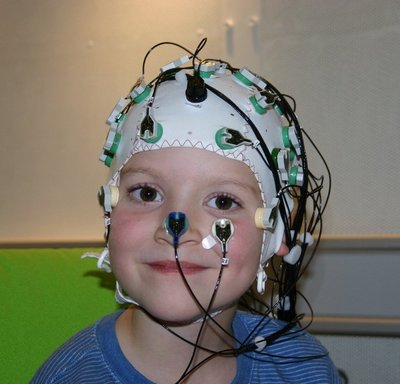
Child with EEG cap 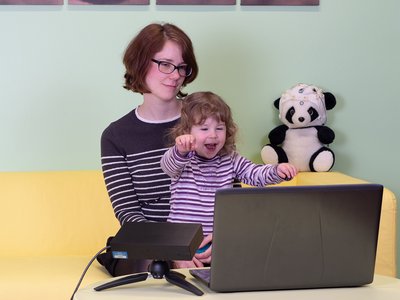
With the help of an eye-tracker, pupil changes can also be measured in kindergarten children. In our children's studies we examine children aged 1-18 years with different methods. We submit all studies to the responsible ethics committee for safety evaluation.
What we measureResponse times and hits
When we solve a problem, we can be distracted by background noise which affects our performance. Therefore, in some studies, we measure the speed and accuracy of responses to a particular task when disruptive events occur simultaneously.
Electroencephalography (EEG)
We measure brain electrical activity - which is always present - with electrodes mounted on a specially made hood while the child is solving a task, watching a movie or playing. Certain patterns in brain activity allow statements to be made about cognitive processes, such as whether a person is temporarily distracted.
Eye movements and pupil size
Where people look, how long they look at something and how their pupil size changes can be inferred from attention and learning processes. Eye movements and pupil size are recorded with a special camera that is placed at some distance in front of the child while it is solving a problem.
ContactDunja Kunke
E-Mail: kinderstudien@lin-magdeburg.de
Tel: 0391 626 393431 (AB) - Media coverage
Media coverage
2025
November/December 2025, ZEIT WISSEN Nr. 06
Scheinwerfer und Laternen2024
12.09.2024, Tagesspiegel
Jetzt konzentrier dich mal! Was Eltern über Aufmerksamkeit wissen sollten.2022
27.12.2022, Volksstimme
Wie Kinder zum Lernen motiviert werden können19.07.2022, Volksstimme
Wie aufmerksam bist Du?16.07.2022, MD News
Neuro-Labor statt Ferienlangeweile29.04.2022, Süddeutsche Zeitung
"Wir sind in ständiger Alarmbereitschaft!"02.03.2022, Podcast Science Talk
Neurokognitive Entwicklung und Aufmerksamkeit bei Kindern2021
05.09.2021, Aachener Nachrichten
Das Chaos im Kopf vermeiden04.09.2021, Nürtinger Zeitung
Was im Gehirn passiert, wenn wir abgelenkt sind16.07.2021, MDR Wissen
Wie das Smartphone die Entwicklung von Kindern beeinflusst14.07.2021, Volksstimme
Forscher suchen Kinder für Aufmerksamkeitsstudien
2020
30.09.2020, MDR Aktuell Fernsehen
Was bewirkt die Digitalisierung bei Kindern?29.09.2020, MDR AKTUELL
Was bewirkt die Digitalisierung bei Kindern?16.05.2020 MDR Wissen
Wie unser Gehirn Vorhersagen trifft15.05.2020, Medizin Aspekte
Unser Gehirn kann Vorhersagen treffen – das passiert in unserem Kopf14.05.2020, Pressemitteilung
Korrektur der Zukunft: Vorhersagen unseres Gehirns
2019
12.08.2019, Jahresbericht der FH Magdeburg-Stendal
Ankommen im Leben: Wie unsere Studierenden von Spitzenforscherinnen und -forschern lernen07.08.2019, Südkurier
Gehirn im digitalen Dauerstress: Sollte man Kindern das Handy wegnehmen?31.07.2019, Mitteldeutsche Zeitung
Digitales Dauerfeuer: So wirkt sich die Dauernutzung von Handys aufs Gehirn aus25.07.2019, Spiegel Online
Machen Smartphones den Menschen dümmer?11.07.2019, Manager Magazin
Was Smartphones mit unserem Gehirn machen11.07.2019, ZDF heute
Ablenkung total - Gehirn im digitalen Dauerstress11.07.2019, Süddeutsche Zeitung
Denkzentrale im digitalen Dauerstress06.04.2019, Volksstimme
Wie leicht sind wir abzulenken?02.01.2019, Volksstimme
Aufmerksam oder abgelenkt?
2018
18.12.2018, Pressemitteilung
Verbindung von Grundlagenforschung und Kita-Studium20.04.2018, Bremer Nachrichten
Wann sich Pupillen weiten20.04.2018, Salzburger Nachrichten
Das Gefühl sieht man in den Augen16.04.2018, scinexx
Warum emotionale Geräusche die Pupillen weiten13.04.2018, Pressemitteilung
Die Emotion liegt im Auge des Hörers: Warum überraschende Geräusche die Pupille weiten


